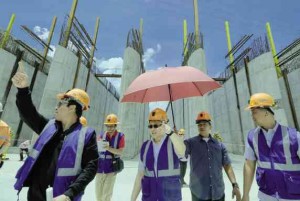
VISIT Businessman Manuel V. Pangilinan (center) and the board of directors of Philex Mining Corp. tour Padcal Mine in Benguet to check on repairs made on its waste facility on June 28. Earlier, he visited Baguio Mayor Mauricio Domogan to discuss his interest in developing Baguio’s water supply distribution. EV ESPIRITU/INQUIRER NORTHERN LUZON
BAGUIO CITY—Businessman Manuel V. Pangilinan is bringing Maynilad’s experts to the summer capital, hoping to invest in the improvement of the city’s potable water supply, a spokesperson for one of his companies said here on Monday.
Baguio’s daily water supply of 55,000 cubic meters has been rationed since the 1990s, partly because of the city’s overpopulation, its denuded forests and watershed areas that have been invaded by squatters.
Pangilinan, chair of Maynilad Water Services Inc., met with Mayor Mauricio Domogan on June 28 to discuss his initiative on water supply, said lawyer Michael Toledo, senior vice president for corporate affairs of Philex Mining Corp.
Pangilinan made the side trip before he proceeded to Benguet to inspect repairs at the Padcal Mine waste facility that is owned by Philex, which he also chairs.
Toledo said the discussions remained at its exploratory stage, but Pangilinan had instructed Philex officials to act as liaison for Maynilad when it starts to study Baguio’s water situation.
Domogan on Monday confirmed the talks and said the city was helping Pangilinan’s technical team to study alternative solutions to Baguio’s water problems.
Pangilinan had described Baguio’s water rationing as ironic because the mountain city receives the highest rainfall in the country, Toledo said.
“Mr. Pangilinan is looking at the possibility of catching [and harvesting] rainwater,” he said.
The city government has been studying rainwater harvesting as an option, after Public Works Secretary Rogelio Singson proposed to convert Baguio’s perennially flooded community, known as City Camp Lagoon, into a rainwater reservoir.
However, the Department of Public Works and Highways has not pursued the project, pending the completion of a tunnel that would discharge water collected during rains in the area, said Ireneo Gallato, Baguio district engineer.
The Baguio Water District (BWD) supplies the city with water pumped from 60 deep wells, which require seasonal replenishment during the monsoon season, city records showed.
The southern sections are supplied with treated rainwater that is collected at the BWD’s rain basin at Mt. Sto. Tomas.
The BWD took part in the talks with Pangilinan, said lawyer Marissa Tenedero, BWD assistant general manager. She said Pangilinan’s proposal may be undertaken through a bulk water supply project, which was developed in 2004.
Benguet Corp. won the bulk water supply contract in 2007, but it was subjected to renegotiation and was eventually terminated after the BWD rejected the mining firm’s plan to convert an old open-pit mine in Itogon, Benguet, into a reservoir, BWD records show.
Benguet Corp. had asked a Baguio regional trial court in 2007 to compel the BWD to proceed with the bulk water contract, but the case has yet to resolved, Tenedero said.
She said the lawsuit should not stop the BWD from pursuing a new supply project.
“Mr. Pangilinan is very serious about investing in Baguio waters. He considers Baguio a very important city,” Toledo said, noting that Pangilinan spent time at Teachers’ Camp during summer whenever his mother was required to attend teachers’ conferences and other assemblies here.
Pangilinan first showed his interest in Baguio’s water supply when he met reporters here at Baguio Country Club on June 27.
Pangilinan asked: “How is your water situation here? Where do you get your water? What is the system of collecting the water? [By] deep well? That’s environmentally unfriendly, right?”
“You should build a bulk water supply system,” he said, adding that he was willing to invest in such a project.